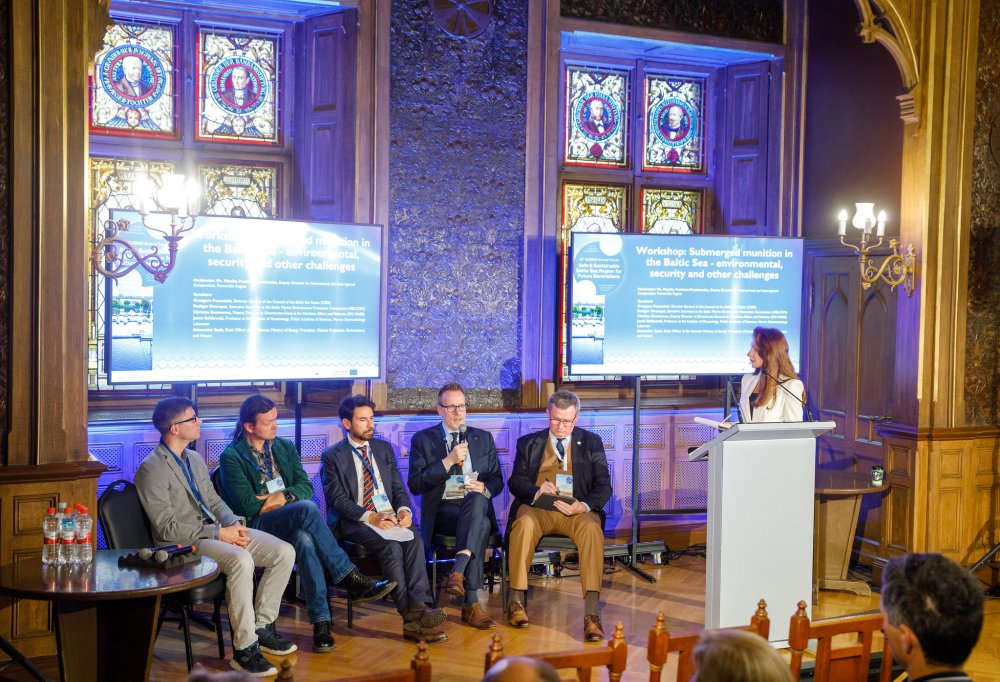News
Annual Forum 2023: Submerged Munitions in the Baltic Sea - Environmental, Security, and Other Challenges
- Details
- Published: 11 October 2023
Text: Monika Pochroń-Frankowska, Deputy Director for International Cooperation for the Pomorskie Regional Government and Board Plenipotentiary of “Pomorskie in the EU” Association – partner of Lets Communicate project. A former Secretary-General of the Baltic Sea States Sub-regional Cooperation (BSSSC).
In the panel, from the left: Alexander Bach, Jacek Bełdowski, Christos Economou, Rudiger Strempel, Grzegorz Poznański.
The Baltic Sea, despite its beauty and importance as a vital ecosystem, hides a danger beneath its surface. Thousands of tons of unexploded bombs, mines, and other munitions were dumped in the sea after World War II, posing a significant threat to the safety of maritime activities and the delicate balance of marine life. In Annual Forum 2023, Pomorskie Region, together with two partner organisation, organised a workshop on submerged munition. Read below Monika Pochroń-Frankowska's report from the workshop.
This is not a coincidence that Pomorskie was the organizer of a panel discussion regarding submerged munitions. As a Member of the European Committee of the Regions, the Marshal of Pomorskie, Mieczyslaw Struk many times appealed to the international community to save the Baltic Sea waters. He said that the threat to health and the environment posed by ammunition, sunken ships, and, above all, chemical weapons dumped in European waters, is not only a regional problem, but also a European, and even global one. Possible leakages and unsealing will in the short and long term, have unpredictable effects on a cross-border economic and social dimension. Mieczyslaw Struk welcomed the European Parliament’s resolution[1] which calls to coordinate the activities of the European Union, NATO, and the Member States in the neutralization of the threat and added that the CoR, as the body representing the voice of local and regional communities, aware of the immediate threats that abandoned weapons pose to the health, life, and well-being of people in coastal regions, should reinforce the European Parliament’s call to put the matter on track.
During the workshop, we host all the key players and important stakeholders in the matter of the submerged munitions in the Baltic Sea. Christos Economou, Deputy Director at the Directorate-General for Maritime Affairs and Fisheries (DG MARE) took part in the discussion and summed up ongoing discussions on the topic of underwater munitions. After Our Baltic Conference 2.0 which was held in Palanga on 29 September 2023 on the EU level the concrete commitments on UneXploded Ordnance (UXO) were taken by the Baltic Sea Member States[2]. The Interreg Baltic Sea Region Programme provided funding for the CHEMSEA, DAIMON and DAIMON 2 projects for a total amount of 10.13 million EUR and new financing tools concerning the dumped munitions in the Baltic Sea are planned to be implemented.
Grzegorz Poznański, Director General of the Council of the Baltic Sea States, was also one of the partners of the workshop. Under the German presidency, CBSS expressed concerns about the underwater munitions and wrecks dumped in the Baltic Sea. Among many other initiatives, in June this year, during the 20th CBSS Ministerial Session the Council adopted the Wismar Declaration[3] that also referred to the underwater munitions. Moreover, during the Our Baltic Conference 2.0. in Palanga, the CBSS expressed the willingness to continue dialogue between different actors. CBSS still sees a need to raise awareness about the dangers of submerged munitions and the need for action among the general public.
Rudiger Strempel, Executive Secretary at the Baltic Marine Environment Protection Commission (HELCOM) was also a co-partner workshop. HELCOM has an undoubted significant role in field of the underwater munition, which is well acknowledged by the Baltic community. In the revised Baltic Sea Action Plan 2021[4], the HELCOM assessed that the Baltic Sea remains heavily impacted by hazardous substances but also promised to develop a regional strategic approach as a part of the HELCOM action plan on hazardous substances by 2024. During the workshop, we heard about the developments in this regard.
Jacek Bełdowski, Professor at the Institute of Oceanology, Polish Academy of Sciences. For years, the Professor has been strongly engaged in international projects and dedicated to mapping the submerged munition in the Baltic Sea. His newest project the MUNIMAP aims to activate and coordinate activities around dumped munitions in the Baltic Sea region. The project is based on the results of previous cooperation within the projects (CHEMSEA, DAIMON, DAIMON 2) in which Pomorskie has been actively involved. Also, Gdynia Maritime University has undertaken an initiative to launch a year-round scientific climate change observatory - the Baltic Centre for Monitoring and Research of the Marine Environment.
Alexander Bach, Desk Officer at the Schleswig-Holstein Ministry of Energy Transition, Climate Protection, Environment, and Nature shared the recommendations from the round table expert discussion on dumped munitions held twice in Kiel. The German Government, as the first EU country, initiated a 100 mln euro national action program to address clearance of underwater munition in the Baltic Sea and clear the Lubeck Bay.
Also, the BSPC addressed concrete recommendations for action to the governments and articulated corresponding targets and in their resolution from 28 August 2023 additional calls for action of dumped ammunition in the Baltic Sea were included[5]. In addition, the BSPC Rapporteur on Sea Dumped Munitions, Anna Kassautzki, issued a further report that deals with the development of dumped munitions and unexploded ordnance in the Baltic Sea until summer 2023[6].
To limit climate change, and protect biodiversity or marine ecosystems, we can no longer ignore the fact, that on the bottom of European waters are delayed bombs. We should bear in mind, that the economic exploitation of the Baltic Sea, which we will not avoid - i.e. establishing wind farms, developing of shipping industry, and building other gas pipelines, increases the risk of releasing poisonous substances into the environment. Clearance of submerged munitions in the Baltic Sea is a great goal, without which reaching a sustainable and prosperous Baltic Sea Region won't be possible in the long term perspective. Therefore, I believe the workshop was of a significant contribution.
[1] European Parliament resolution on chemical residues, 27 April 2021 https://www.europarl.europa.eu/doceo/document/TA-9-2021-0123_EN.pdf
[2] Our Baltic Conference 2023, 29 September 2023Palanga, Lithuania https://oceans-and-fisheries.ec.europa.eu/system/files/2023-09/2023-09-29-our-baltic-commitments_en_0.pdf
[3] CBSS Declaration, 20th CBSS Ministerial Session, 2 June 2023, https://cbss.org/wp-content/uploads/2023/05/cbss-wismar-declaration_2-june-2023.pdf
[4] Baltic Sea Action Plan (BSAP), October 2021, https://helcom.fi/baltic-sea-action-plan/
[5] The Baltic Sea Parliamentary Conference Resolution (BSPC), 28 August 2023 https://www.bspc.net/final-version-32-bspc-resolution-v-28082023_v1/
[6] Report on Sea-Dumped Munitions for the 32nd BSPC, 28 August 2023 (https://www.bspc.net/bspc_report-on-sea-dumped-munitions_22_23/
Submerged Munitions in the Baltic Sea - Environmental, Security, and Other Challenges





